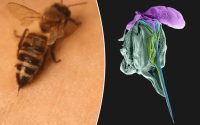1 in 5 people recall ‘lucid dying’ after being revived by CPR
A clearer picture of life after death — albeit short-lived — is coming into focus
A new study has shown that 20% of people on the brink of death have experienced “lucid dying.” The phenomenon is said to occur in the moments between undergoing cardiac arrest, when they are unconscious or dying, and receiving lifesaving cardiopulmonary resuscitation.
One in five survivors reported feeling separated from their body and observing events without pain or distress — which researchers have differentiated from hallucinations, delusions, dreams or living consciousness.
“These lucid experiences cannot be considered a trick of a disordered or dying brain, but rather a unique human experience that emerges on the brink of death,” said lead researcher Dr. Sam Parnia. His team at the NYU Grossman School of Medicine in New York City presented their findings Sunday at a symposium as part of the American Heart Association’s Scientific Sessions in Chicago.
Parnia said the results indicate evidence that some people have a “unique inner conscious experience, including awareness without distress,” after physical death. These extraordinary experiences, as well as heightened brain activity at time of death, suggests that consciousness may carry on in some capacity after death.

Researchers analyzed data from 567 hospital patients who had gone into cardiac arrest and received CPR between May 2017 and March 2020, in both US and UK hospitals. They furthermore included self-reported testimonies from 126 non-hospital survivors of cardiac arrest.
Patients were also tested for hidden brain activity during this time, revealing spikes up to an hour into CPR, including gamma, delta, theta, alpha and beta waves — the same that may occur in the living while performing high-level thought processes.
Upon death, the brain is known to fire off a series of “disinhibition” signals, that open new pathways to memory and imagination. Scientists don’t understand the evolutionary purpose of this process, but it does raise “intriguing questions about human consciousness, even at death,” said Parnia.
Scientists have only begun to reckon with the notion of consciousness as more than just a side effect of having a functional brain. In a statement, Parnia urged for further study into the specific biomarkers of “clinical” consciousness.


